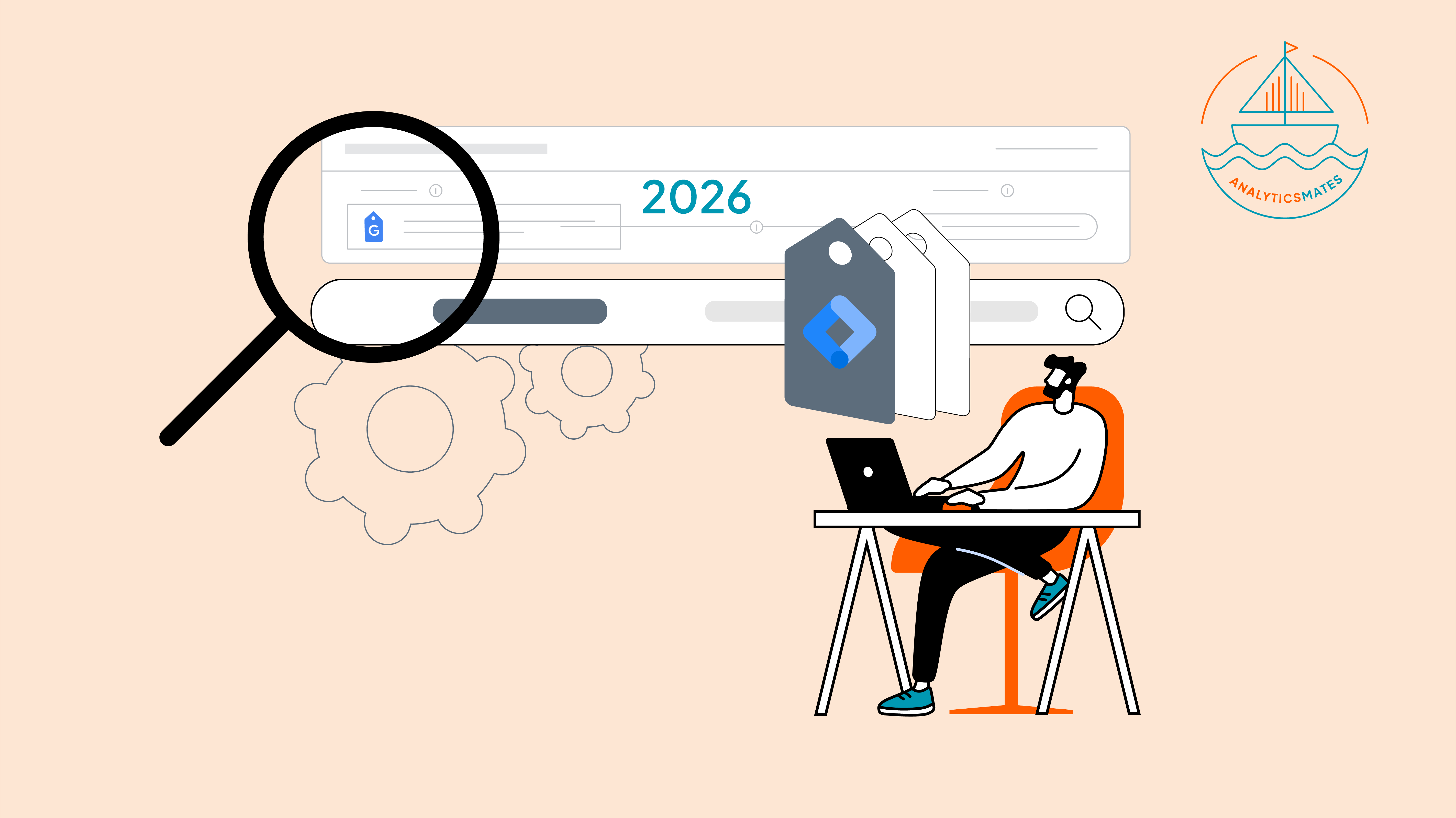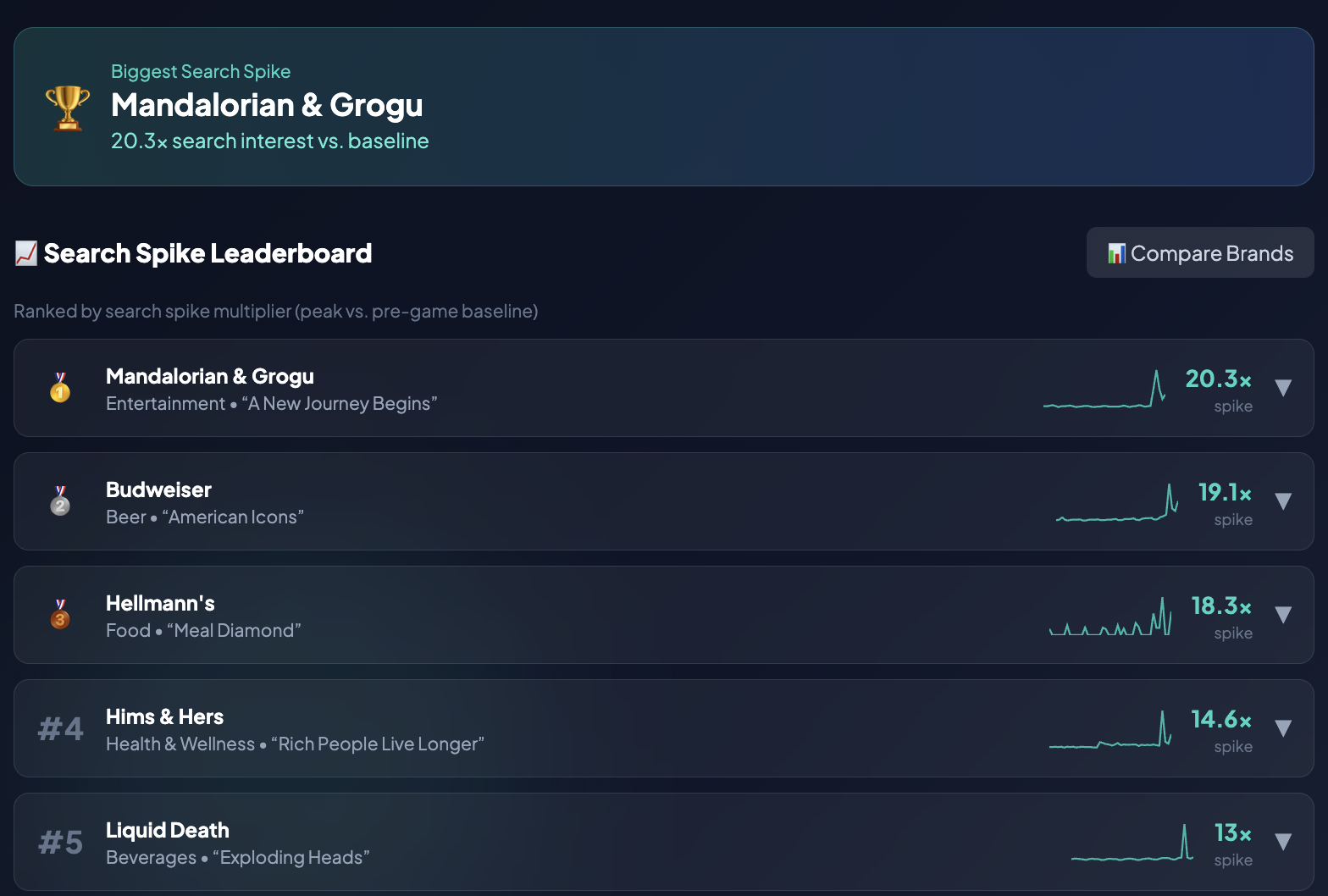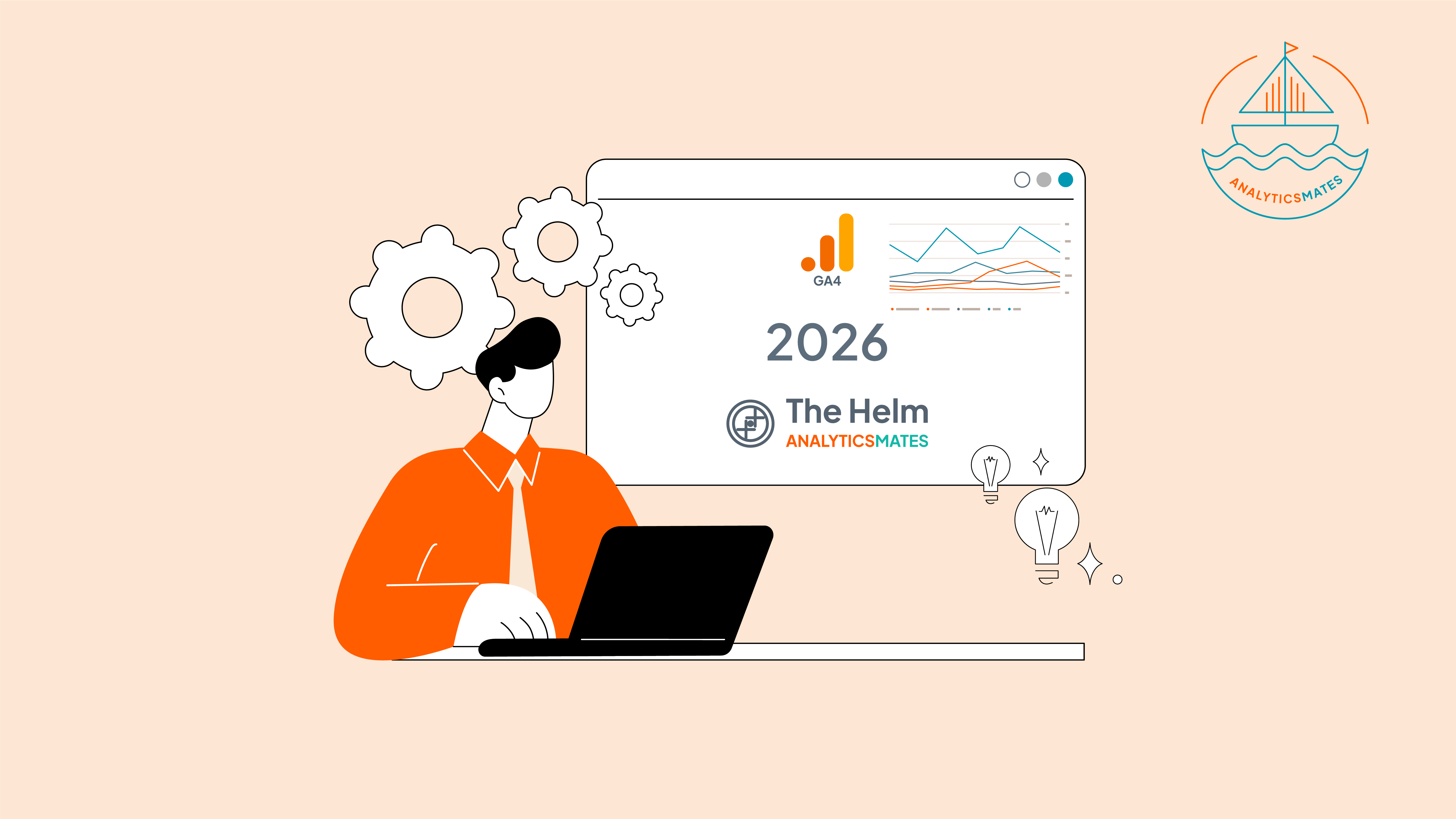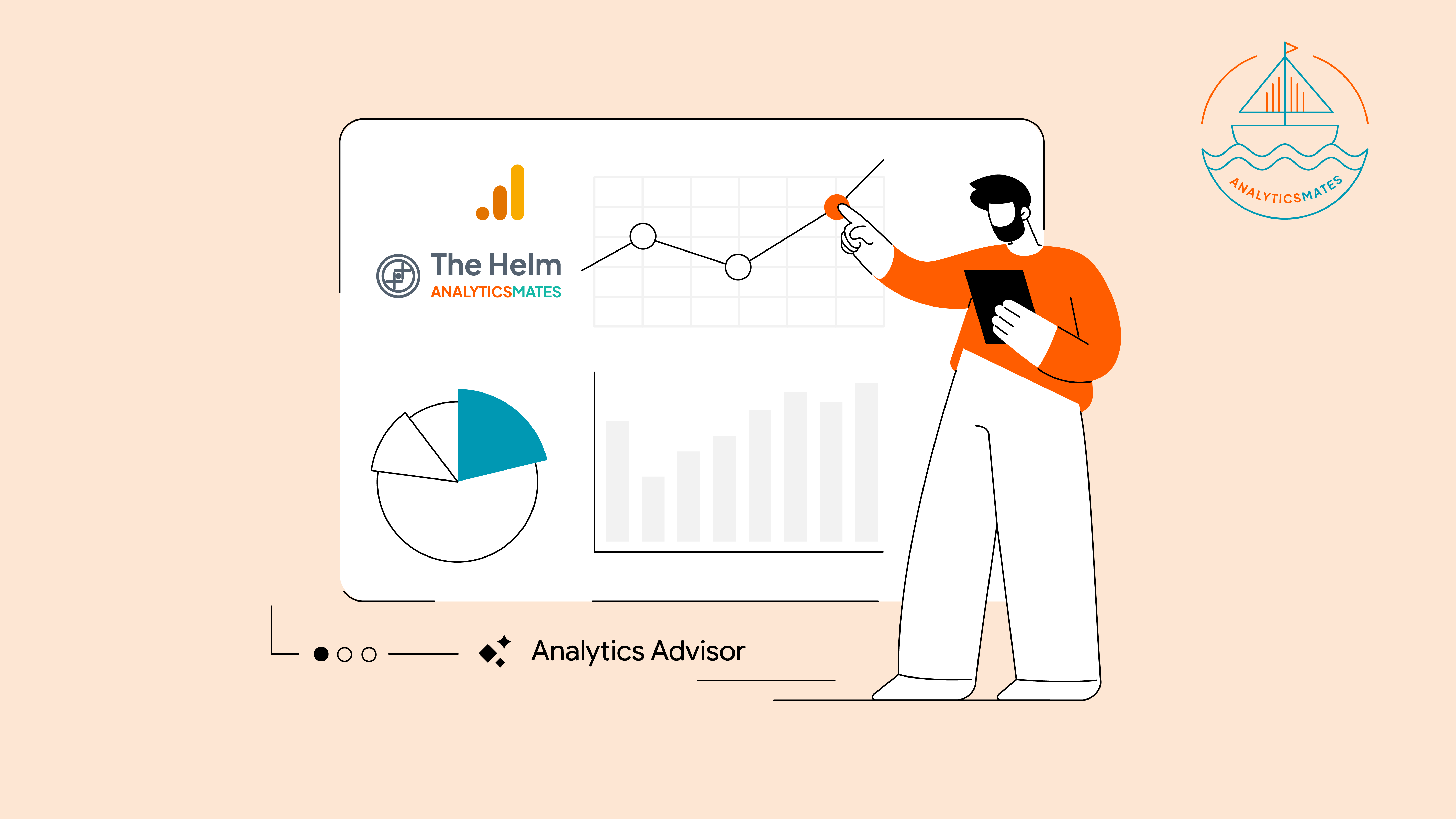We’ve all seen the hype around AI-powered reporting auto-generated insights, dashboards that write their own summaries, and performance recaps that land in your inbox before you even ask. But here’s the thing: even the smartest AI tools are only as good as the data you feed them. And when it comes to GA4, that data has to be set up intentionally if you want reporting that’s actually useful.
In this post, we’re diving into why AI reporting often falls short when your GA4 setup isn’t clean, especially when analyzing SEO performance. We’ll unpack GA4’s Model Context Protocol (MCP), the importance of defining conversions properly, and how to make your data “AI-ready.” Because if your events are messy or mislabeled, AI doesn’t solve the problem, it just amplifies the confusion.
Understanding GA4 Model Context Protocol (MCP) and how it works

The Model Context Protocol (MCP) in Google Analytics 4 isn’t something you’ll see in your usual reports or dashboards. It works behind the scenes to help connect your GA4 data with a Large Language Model (LLM) like Gemini or ChatGPT.
GA4 collects tons of data like who visited your website, what they clicked, and where they came from. MCP then helps turn that data into something you can ask questions about, using everyday language. You don’t need to build a fancy report or know coding. Just ask, and the AI answers based on your data.
Here’s How it works:
- The MCP server creates a secure link between your GA4 data and a smart AI assistant, like Gemini. That assistant can then “understand” how your data is organized. Being organized is a very important thing, and we’ll dive and focus more into this throughout the blog.
- Once connected, you can simply ask things like:
“Which blog posts brought in the most organic traffic last month?”
or
“How has our SEO performance changed over the past quarter?”
The AI looks at your data and gives you a clear answer with no dashboards or digging required. - If your team needs more than just answers, developers can build custom tools (called agents) that run reports, track performance, or even send alerts when something changes. Since MCP helps the AI understand your GA4 setup, these tools are more accurate and tailored to your data.
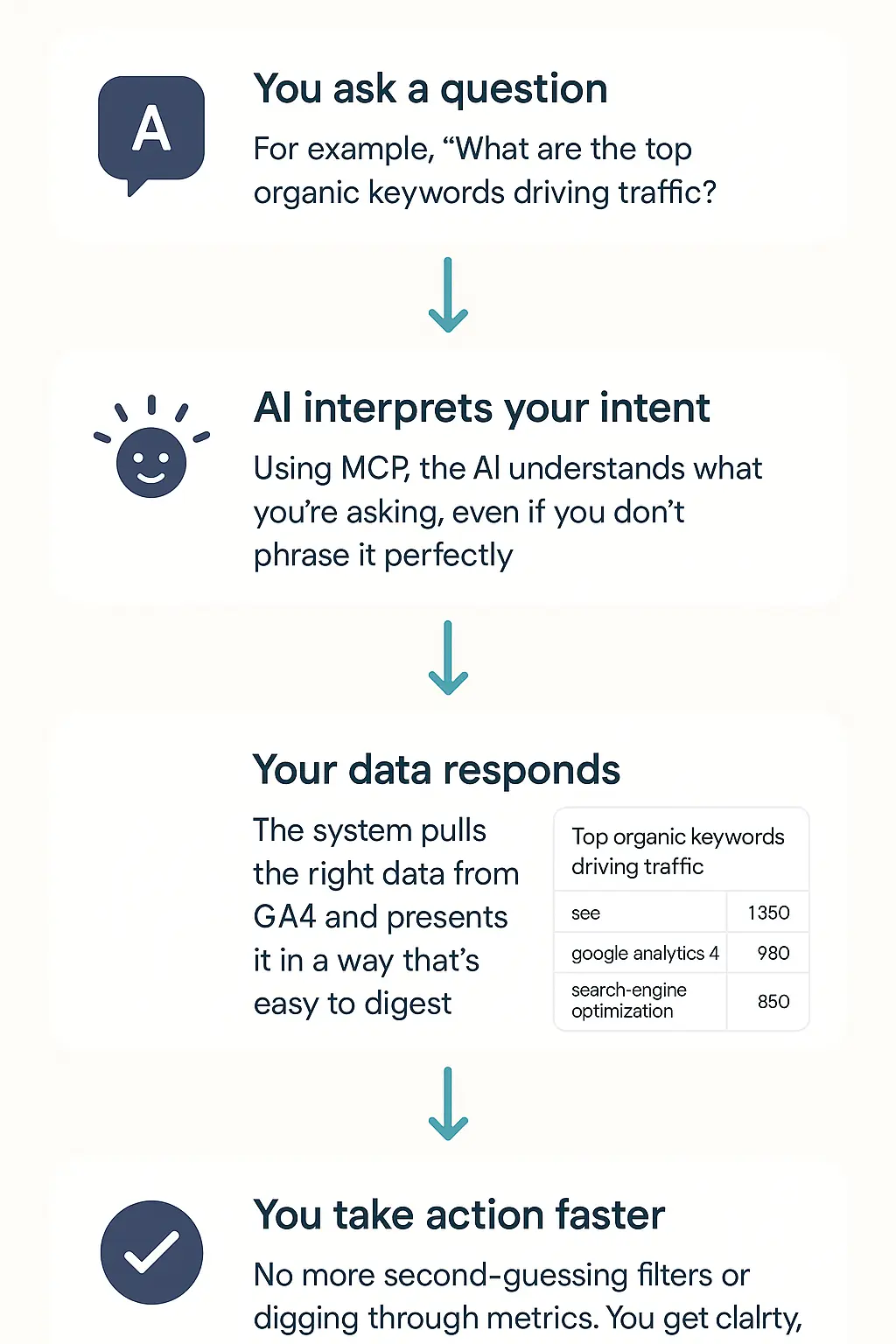
In short, MCP transforms GA4 into a more user-friendly tool by connecting it with AI. Using MCP servers to connect your GA4 data helps teams to no longer need to manually check numbers and scouring reports. They can ask questions right away, get answers fast, and spend more time making decisions rather than spending time with numbers and reports.
You can check out the Google Analytics documentation page for more information on how it works and to connect your Analytics tools with MCP server.
The Promise of GA4's Model Context Protocol (MCP) and Where It Falls Short
MCP is a real game-changer, but it’s also important to understand its current limitations. The promise of using AI to “talk” to your data is an exciting thing, but like any tool, it’s only as good as the foundation it’s built on. What do we mean by that?
To really get meaningful results from MCP, you need to understand that GA4 setup needs to be organized, clean, and complete. For example, if your event tracking is patchy or misconfigured, then AI simply doesn’t have enough context to give you valuable insights. It might even give you the wrong information. This is especially true for users relying on tools like GTM to track conversions, custom events, or user behavior.
Here’s why that matters:
- MCP, if not entirely, mostly depends on properly tagged data. Take it this way, if critical events aren’t tracked in GA4, MCP won’t know they exist. It can't guess what isn't there.
- Remember that missing events limit the insight quality. Without clear markers for things like purchases or sign-ups, MCP may default to surface-level metrics like sessions or bounce rates. And obviously you don’t get results as you want or expect them to be.
- Shallow results can be misleading
Imagine asking “What are my best SEO pages?” If conversions aren’t tracked properly, MCP might highlight pages with the most visits, not the ones actually driving business results.
The bottom line? MCP is a powerful tool, but it’s not a shortcut. To fully see its potential, your analytics setup must be solid. That means investing time in event planning, implementation, and regular audits of your GA4 and even GTM configuration.
The Real Value of Clean SEO Data: Why MCP Changes the Game
Let’s get into more examples in this section. So, imagine two marketing teams trying to understand which blog posts are truly bringing high value impact like conversions.
- Team A has set up GA4 to track meaningful events: scroll depth, time on page, and lead form completions. All clearly labeled and tied to their business goals.
- Team B, on the other hand, tracks everything the same way. Button clicks, page views, form attempts. They’re all lumped together without much context.
Now, using the MCP server with Google Analytics, both teams run their query to generate performance insights.
- Team A's generated answer from MCP-LLM says:
“Organic traffic to Page X drives 70% of lead form submissions with above-average engagement.” - Team B’s generated answer from MCP-LLM says:
“Top page: High engagement.” But what does that really mean?
So all this just means, clean events tell a story. Messy data creates noise. And so here’s the catch: even the smartest AI models can’t turn noise into clarity.
Let’s check another example, say you're trying to answer a simple question:
“Which blog posts are bringing in the most value through organic search?”
You start with traffic reports from GA4 or Search Console. That’s the easy part. But traffic alone doesn’t reflect impact or efficacy. You might find one post with 5,000 visits and another with just 800, but the smaller one is driving far more conversions than the higher visits.
And that’s that, without clean conversion tracking and well-defined events in GA4, your AI tools can’t see that. They'll assume the higher-traffic post is “better.” And if your tagging is not clear or inconsistent, even the best models won’t get it right.
So what we’re really trying to say and share here is that:
- Clean data allows AI to give you more meaningful data.
- Messy tagging (conversions) and patchy tracking implementation, leads to shallow or misleading reports.
- MCP tells AI tools to prioritize what matters and that is real SEO performance, not just traffic volume.
Why Defining Conversion Events Is Non-Negotiable
AI fully relies on well-defined patterns. MCP takes your GA4 events and makes them digestible for language models like Gemini or other AI assistants. But when your events are unclear, say, lumping scroll depth and lead submissions into a generic “conversion” label, you make it nearly impossible for the AI to interpret your data correctly.
Here are few tips on how MCP gets the right context from your data:
Step-by-step: How to Align Conversion Tracking with MCP
- Properly define your primary and secondary conversions separately. Secondary conversions (like button clicks or video plays) show interest. Primary conversions (like form submissions or purchases) show intent. MCP needs this distinction to prioritize what matters when responding to queries or generating.
- This is mostly ignored, but it's very important, use consistent naming conventions across platforms. Language models rely on clean, and predictable structures. If one platform uses “form_submit” and another says “lead_complete,” MCP can’t always connect the dots. Stick to a single naming system to keep your data coherent.
- Adopt GA4’s recommended event names
MCP is built with GA4’s architecture in mind. Using Google’s native event names like generate_lead, purchase, or sign_up gives MCP a stronger base to understand user actions and link them to business outcomes.
The better your events are defined, the more accurately MCP can respond to questions like “Which content drives leads?” or “What actions result in purchases?” Instead of guessing, it draws insights from clearly labeled milestones.This is of course just secondary to an organized, and complete event tracking implementation.
Preparing GA4 Data for MCP and AI Readiness
Before we wrap up, we just want to leave you with this.
“MCP readiness” isn’t just about flipping a switch. It means making sure your data is structured, and aligned with results that actually matter to your business. That said, here’s a simple step-by-step approach to get your GA4 in shape:
- Audit your events and tracking set up.
- Are they still relevant to your business goals?
- Are any events misfiring or duplicated?
- Are you missing high-value actions like form submissions, purchases, or video plays?
- Align tracking with real goals. Think beyond surface metrics like pageviews or sessions. Make sure your tracking supports things that actually move the needle.
- Do your events help you understand SEO performance, content engagement, or conversion drop-offs?
- Are you properly tracking your key events like consultations, bookings or purchases.
- You can also use GA4’s s Audiences or Content Groupings to organize your data more effectively.
FAQs
Can I use GA4 and MCP to track performance across multiple websites or domains?
A: Yes, but you need to ensure proper cross-domain tracking is set up in GA4. MCP can then access unified data if your GA4 property is structured correctly.
What’s the difference between GA4’s MCP and the older Universal Analytics features?
A: MCP introduces an AI-friendly data structure that wasn’t part of Universal Analytics. It enables language models to query data naturally, while UA focused more on static reports and dashboards.
Do I need technical skills to set up GA4 for AI-readiness?
A: Not necessarily. While some tasks like GTM tagging and event configuration may require light technical help, many aspects like naming conventions and event planning can be done by marketers or analysts.
How long does it take to start seeing meaningful insights from MCP once GA4 is configured properly?
A: You can start getting quality responses right away, but richer insights improve over time as more data is collected and refined.
What are “custom dimensions” and should I use them with MCP?
A: Custom dimensions let you track additional context beyond standard GA4 metrics. When structured well, they can help MCP provide more nuanced answers about user behavior or campaign effectiveness.
Is there a risk of AI interpreting sensitive or private data in GA4 through MCP?
A: Yes, if personal data is collected improperly. Always follow privacy guidelines and avoid sending PII (Personally Identifiable Information) into GA4. MCP interprets what’s available, so clean, privacy-safe data is essential.
Can I use MCP to automate reports for non-technical stakeholders?
A: Yes. When paired with tools or agents, MCP can generate automated summaries tailored to different teams—marketing, leadership, content, etc. in plain language.
How can MCP help with content strategy beyond SEO performance?
A: MCP can identify engagement trends, time-on-page insights, and conversion paths tied to content. It helps surface what resonates most with audiences based on actual behavior.
Can MCP work with real-time GA4 data?
A: MCP is generally more effective with aggregated historical data. Real-time data may be accessible depending on your integration, but it's best used for pattern recognition, not minute-to-minute monitoring.
What are common mistakes teams make when preparing GA4 for AI use?
A: Top issues include: inconsistent event naming, ignoring secondary conversion tracking, over-tagging irrelevant actions, and skipping regular data audits. All of these reduce AI effectiveness.
Conclusion
The MCP and AI-powered feature in Google Analytics 4 is changing the game for marketers, but only if your data is ready for it. Keep in mind that clean data is not just a best practice, but it’s an important step that makes AI analysis truly useful.
If your GA4 setup is messy, AI won’t save you. It'll just work faster at making the wrong assumptions. So you need to make sure that to start with a solid tracking strategy, define your conversions clearly, and make your analytics stack AI-ready. The more intentional your setup, the more confident you’d be to use an AI assistant to run your GA4 data.
Thank you for reading!
We're always looking for ways to improve our Google Analytics 4 blog content. Please share your feedback so we can make it even better.
See Article Images









